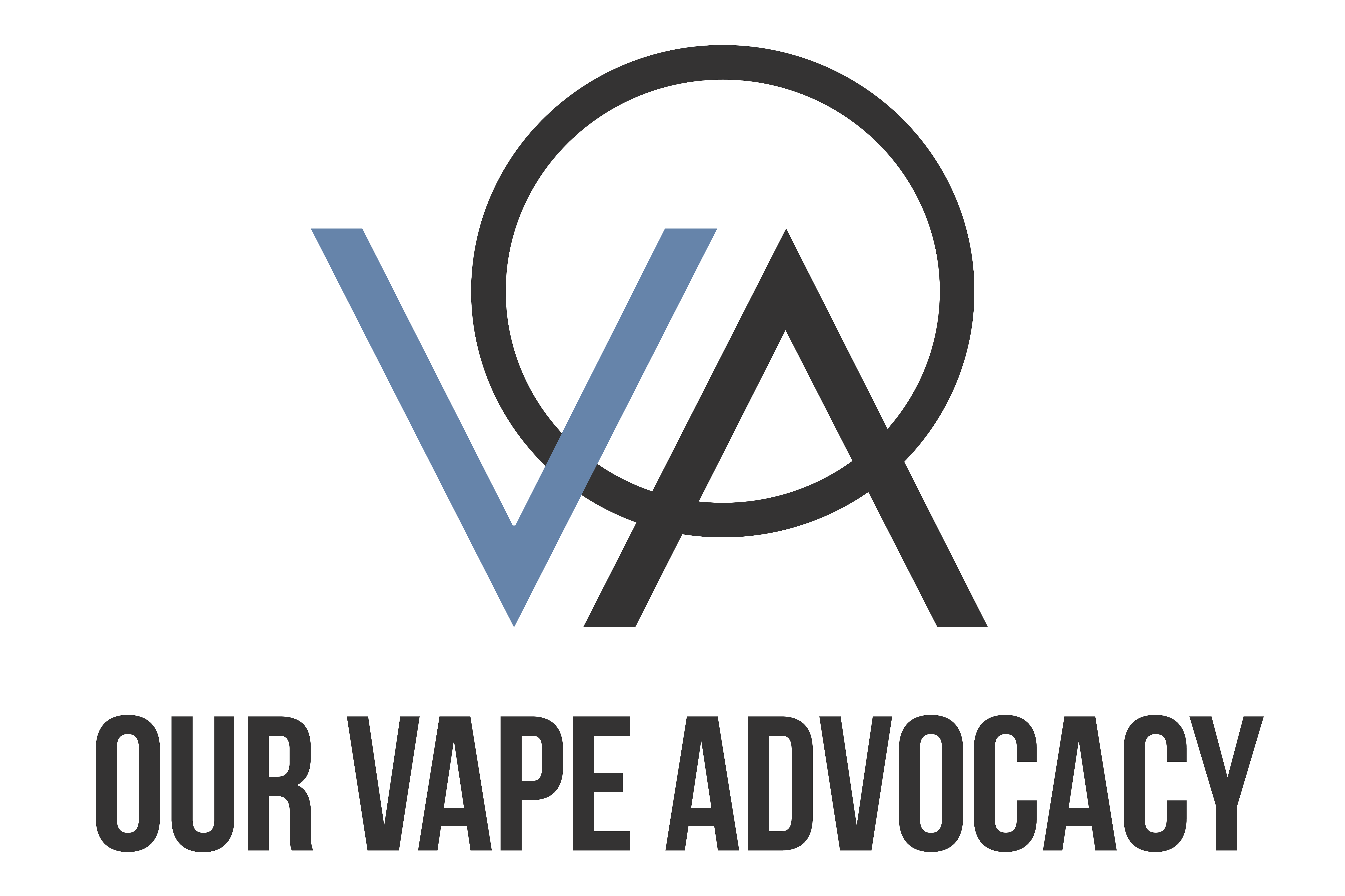Navigating the UK vaping market requires an in-depth understanding of its regulatory landscape. From product standards to advertising restrictions, the laws are designed to maintain safety and transparency.
Here at Our Vape Advocacy, we aim to equip you with essential insights and practical tips for compliance.
What Are the UK Vaping Regulations?
To navigate the UK vaping market effectively, understanding the specific regulations is essential.
Overview of Current Laws
The primary regulatory framework governing vaping products in the UK is the Tobacco and Related Products Regulations 2016 (TRPR). This mandates that nicotine-containing e-liquids must have a nicotine concentration of no more than 20 mg/mL. Consequently, all products must meet stringent safety and quality standards before they are introduced to the market. Non-compliance can lead to legal penalties and product recalls.
Key Regulatory Bodies
Several bodies oversee the vaping market. The Medicines and Healthcare products Regulatory Agency (MHRA) ensures that all vaping products comply with safety standards before they reach consumers. Their inspections and certifications play a crucial role in maintaining product quality. Additionally, Trading Standards officers enforce retail compliance, focusing on age restrictions and the legality of the products sold. Importantly, their efforts are critical in curbing the sale of illegal vapes.
Recent Changes in Legislation
The vaping landscape is constantly evolving. For instance, 2023 saw significant enforcement actions against illegal vaping products, with 1.57 million illicit vapes seized. This heightened scrutiny underscores the need for vendors to adhere strictly to legal standards. Plans for a new licensing framework are in progress, which will require vape shops and distributors to obtain licenses, ensuring compliance and blocking rogue retailers. This framework, inspired by New Zealand’s model, aims to generate over £50 million annually to fund enforcement.
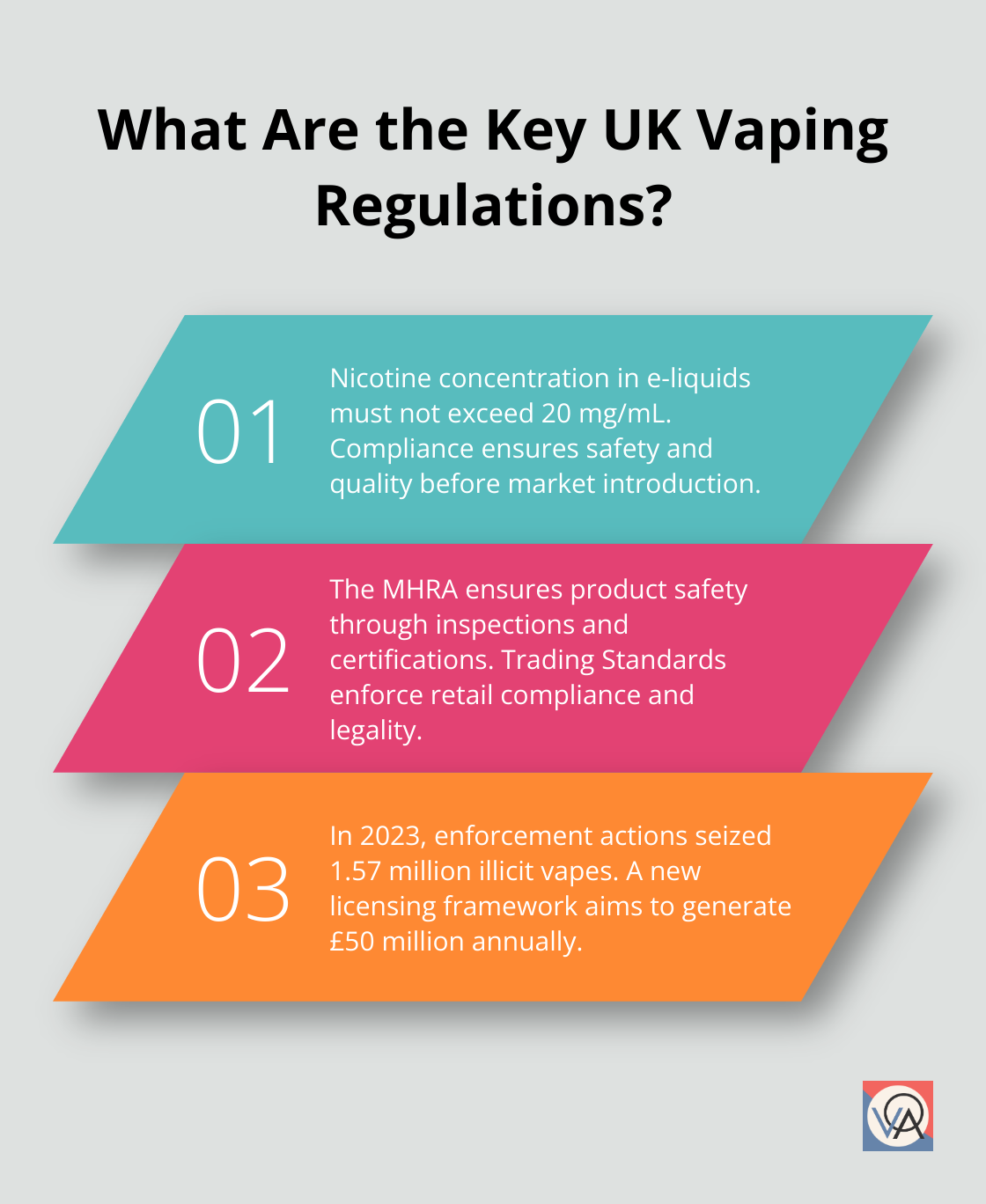
Understanding these laws and bodies not only helps businesses stay compliant but also builds consumer trust. The robust legal structure in place demonstrates the UK’s commitment to safety and integrity within the vaping market.
What Are the Compliance Requirements for Vaping Products?
Navigating compliance for vaping products in the UK means meeting various standards and regulations that are essential for product safety and legal trading. Understanding these requirements can help businesses avoid penalties and build a trustworthy brand.
Product Standards and Certifications
Vaping products must adhere to specific standards to be legally sold in the UK. The TRPR mandates that nicotine-containing e-liquids should have a nicotine concentration of no more than 20 mg/mL. This ensures that the products pose minimal health risks to consumers. Before a product can enter the market, it must pass safety and quality evaluations conducted by MHRA. Failing to meet these criteria can result in product recalls and hefty fines. Businesses should invest in comprehensive testing and quality assurance processes to ensure compliance from the outset.
Packaging and Labeling Standards
Proper packaging and labeling are critical for compliance. The TRPR specifies that all vaping products should be sold in child-resistant packaging to prevent accidental ingestion by children. Furthermore, labels must include detailed information such as a list of ingredients, health warnings, and nicotine strength. This transparency is vital for consumer safety and trust. For instance, studies have shown that clear labeling can significantly reduce accidental nicotine ingestion, building consumer confidence in the product. Regular audits and updates to packaging processes can help ensure continued compliance with evolving regulations.
Advertising and Promotion Restrictions
Strict advertising rules govern how vaping products can be promoted. The CAP and BCAP Codes prohibit misleading claims and restrict promotional activities that could appeal to minors. For example, using cartoon characters or offering free samples at youth-oriented events is banned. These restrictions aim to prevent underage vaping and promote responsible marketing. Businesses should create rigorous vetting processes for all advertising materials to avoid inadvertent breaches. Statistics indicate that companies adhering to these guidelines see fewer legal challenges and better public perception.
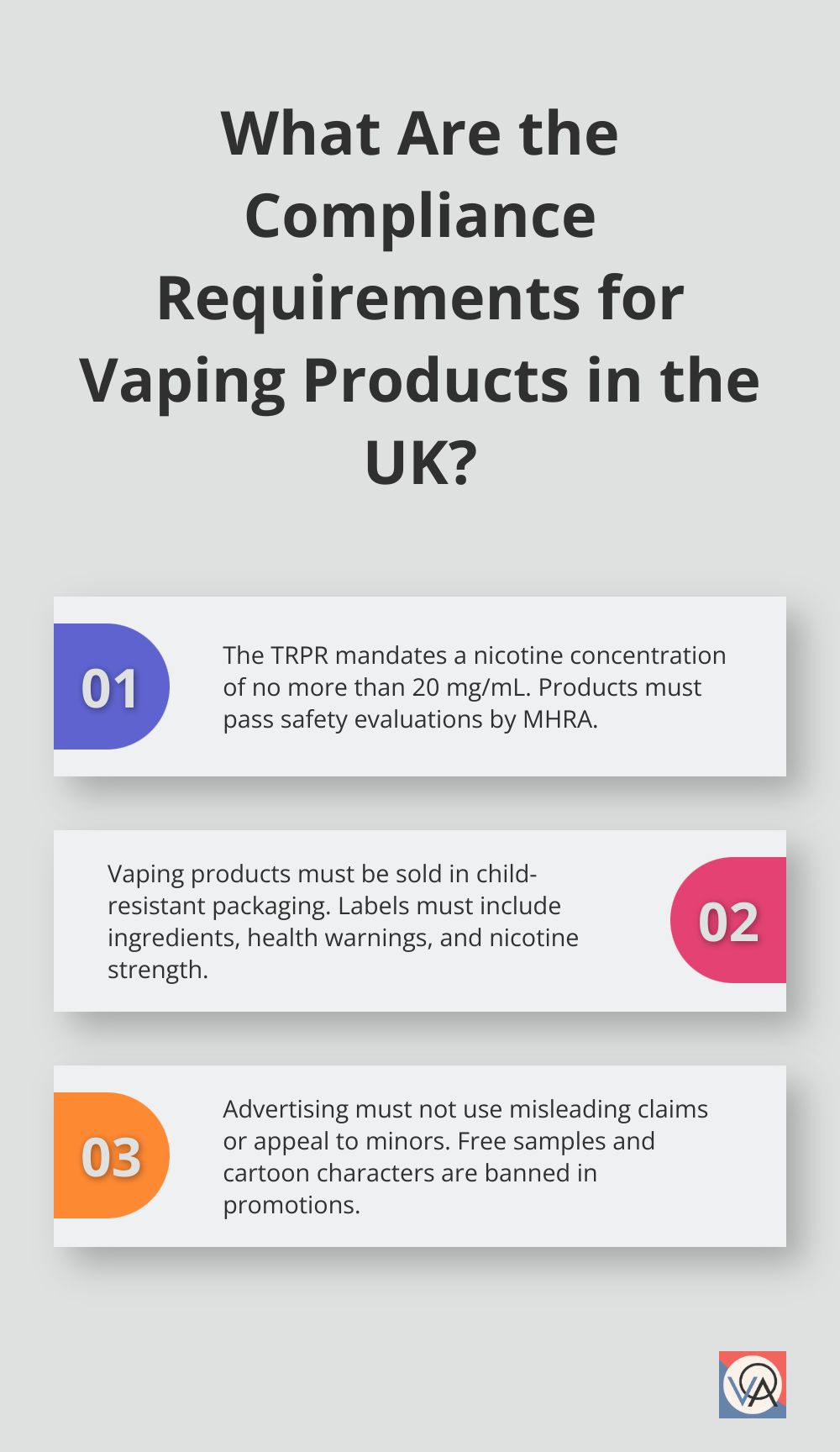
By adhering to these compliance requirements, businesses not only avoid legal pitfalls but also cultivate a responsible and trustworthy market presence. It’s essential to stay up-to-date with regulatory changes and consistently enforce compliance measures within your operations.
How to Stay Compliant in the UK Vaping Market
Staying compliant in the UK vaping market is paramount for any business aiming to succeed. With meticulous regulations in place, proactive steps are vital. Below, we provide concrete strategies to help you navigate this complex landscape effectively.
Keeping Up with Regulatory Changes
The vaping industry is dynamic, with regulations continually evolving. Being informed about these changes is crucial. Subscribe to updates from key regulatory bodies like the MHRA and Trading Standards. Regularly attending industry-specific conferences and webinars can offer insights into upcoming legislative amendments. According to a recent survey, businesses that invest in regulatory monitoring saw significant benefits in compliance.
Utilizing Legal and Compliance Tools
Leveraging specialized legal and compliance tools can streamline your operations. Tools like compliance management software aid in tracking regulatory requirements and deadlines. These systems provide automated alerts for regulatory updates, ensuring your products meet all legal standards. A study by Compliance Week reported that 70% of businesses using such tools experienced improved regulatory adherence and operational efficiency.
Engaging with Trade Associations and Advocacy Groups
Active participation in trade associations and advocacy groups has multiple benefits. These organizations offer valuable resources such as industry reports, compliance guidelines, and training sessions. Membership can also provide a platform for lobbying efforts, influencing favorable regulatory outcomes. Data from the UK Vaping Industry Association (UKVIA) indicates that members had fewer compliance issues, with increased regulatory awareness compared to non-members.
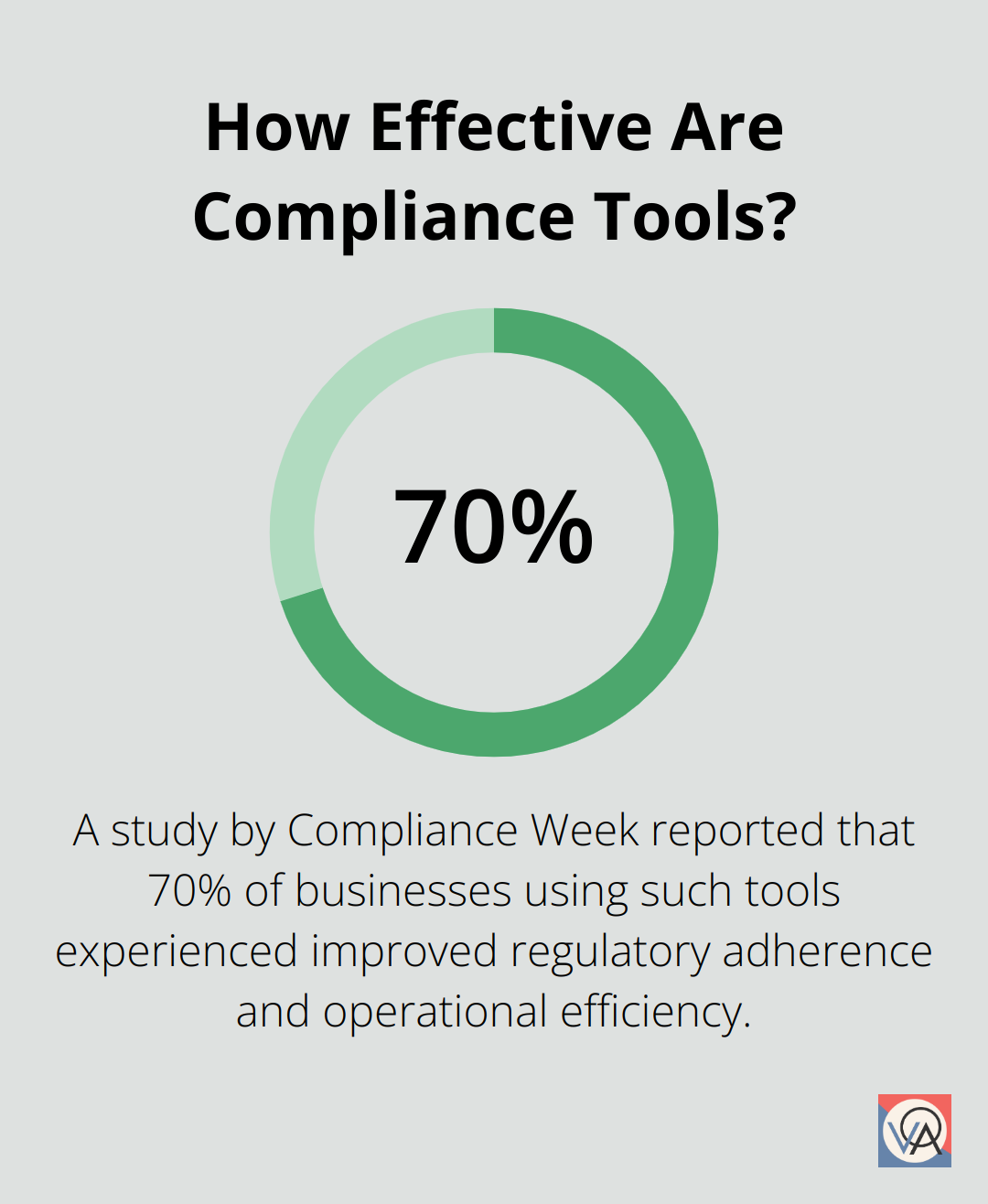
Engaging with these groups also fosters a collaborative approach to tackling industry challenges, ensuring your business remains at the forefront of best practices.
Conclusion
Navigating the UK vaping market requires a thorough understanding of the regulatory landscape, encompassing everything from product standards to advertising restrictions. Compliance with the Tobacco and Related Products Regulations 2016 (TRPR) is essential, especially with nicotine concentration limits set at 20 mg/mL. Regulatory bodies like the MHRA and Trading Standards play a pivotal role in maintaining safety and quality, while recent legislative changes underscore the importance of adhering to legal standards to avoid significant penalties.
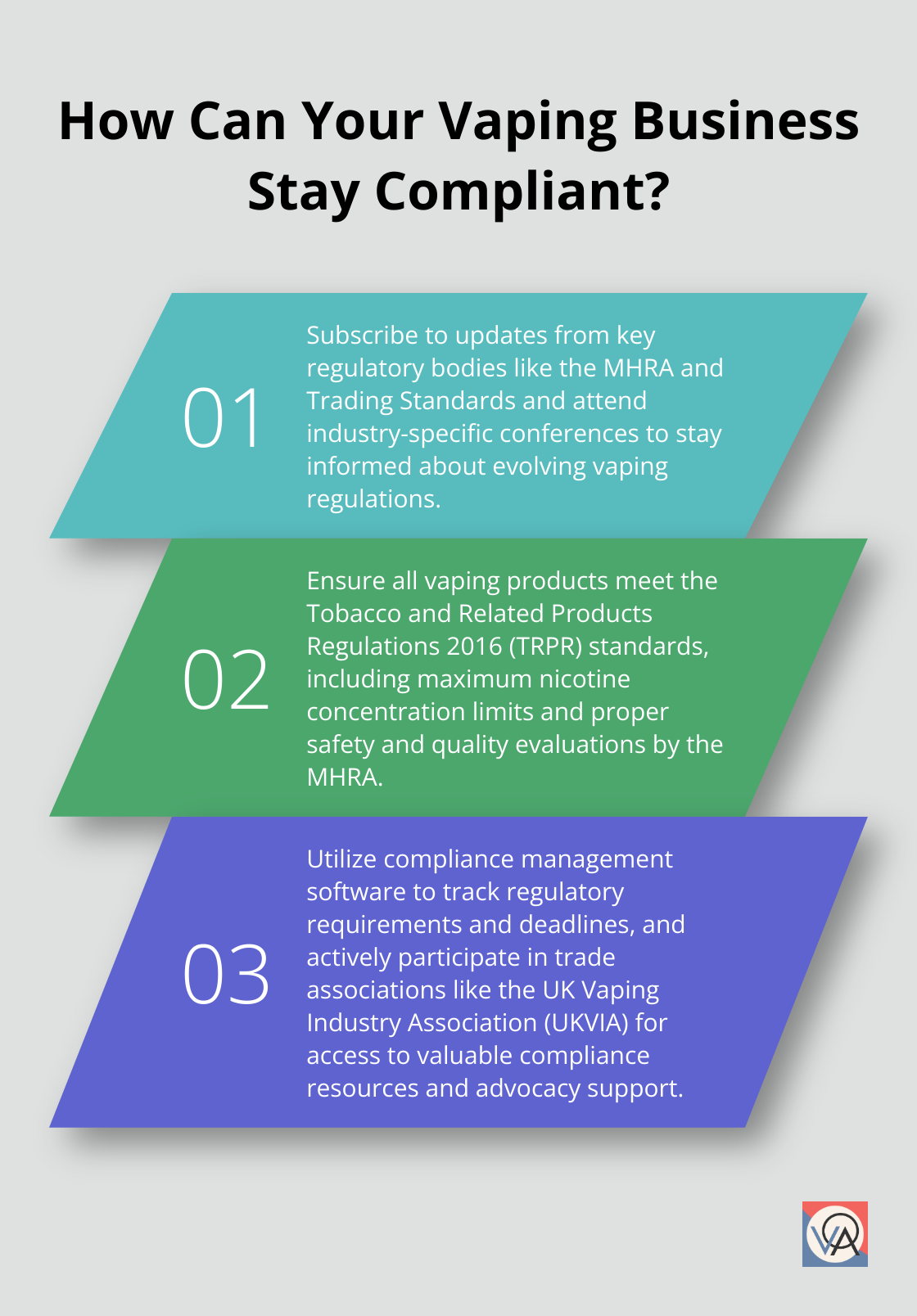
Meeting compliance requirements involves ensuring that vaping products pass stringent safety evaluations, are appropriately packaged and labeled, and adhere to strict advertising rules. By implementing proactive strategies such as staying informed about regulatory changes, leveraging compliance tools, and engaging with trade associations, businesses can navigate this complex landscape effectively.
Compliance is not just about avoiding legal pitfalls; it builds consumer trust and demonstrates a commitment to safety and responsibility. With a constantly evolving market, businesses must remain vigilant and adaptable to stay ahead.
Looking ahead, the UK vaping market is poised for continued growth, especially with the introduction of new regulatory frameworks designed to curb underage and illicit vape sales. These measures will enhance enforcement and compliance, fostering a safer and more transparent industry.
At Our Vape Advocacy, we aim to support the UK vaping sector by promoting sensible regulations, combating illicit products, and safeguarding businesses. Together, we can advance public health and foster responsible practices within the industry.
